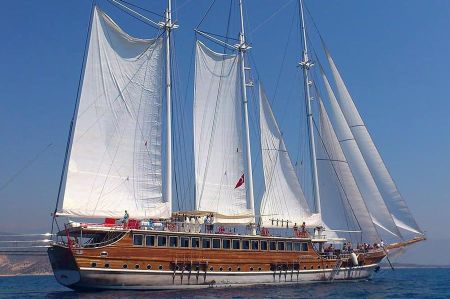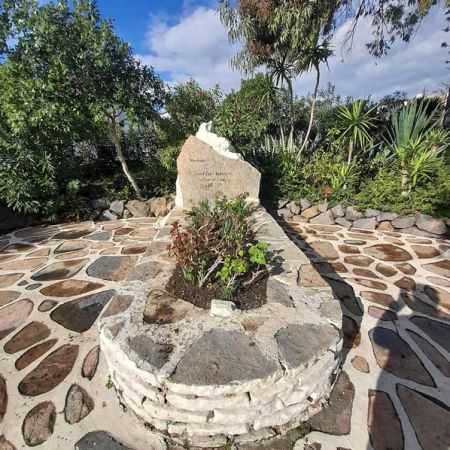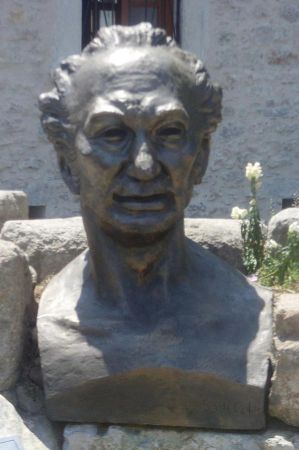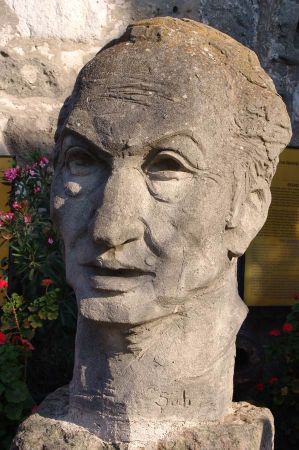The Fisherman of Halicarnassus - Bodrum
- Written by Portal Editor
Cevat Şakir Kabaagaçlı, the son of an Ottoman family who had earned his doctorate from Oxford, was accused and convicted of an obscure crime in 1925 and subsequently emigrated to Bodrum for three years.
At that time, Bodrum was an isolated place, simple and poor, where people could only earn a living through some fishing and diving for sponges.
Cevat Şakir Kabaagaçlı - "The Fisherman of Halicarnassus"
 Cevat Şakir Kabaagaçlı subsequently became well-known as "The Fisherman of Halicarnassus" due to his numerous published novellas, stories, and articles, which reflected his deep-rooted culture. He wrote about happy times in the past, how the sea ruled the city, the air dry and clear as if illuminated by an inner light, about the beauty and wealth of Anatolia and its people, and the humanity of the people of the Aegean Sea. He introduced new fishing methods and planted palm trees along the waterfront. Most fascinating, however, were his stories about the ancient civilization of the Aegean and its people. Kabaagacli fell completely in love with the Bodrum area and decided to stay here for the rest of his life. Two generations of young Bodrum residents grew up under his influence.
Cevat Şakir Kabaagaçlı subsequently became well-known as "The Fisherman of Halicarnassus" due to his numerous published novellas, stories, and articles, which reflected his deep-rooted culture. He wrote about happy times in the past, how the sea ruled the city, the air dry and clear as if illuminated by an inner light, about the beauty and wealth of Anatolia and its people, and the humanity of the people of the Aegean Sea. He introduced new fishing methods and planted palm trees along the waterfront. Most fascinating, however, were his stories about the ancient civilization of the Aegean and its people. Kabaagacli fell completely in love with the Bodrum area and decided to stay here for the rest of his life. Two generations of young Bodrum residents grew up under his influence.
In the 1960s, Cevat Sakir introduced a group of young intellectuals from Istanbul, seeking aesthetic ecstasy and new spiritual inspiration, to the entirely new experience of what would later become known as the Blue Voyage (Mavi Yolculuk). Sailing along the coast on a simple fishing boat, admiring the natural geographical beauties while discovering the ancient monuments and legacies of the various rich Anatolian civilizations, was a unique experience. Indeed, these groups discovered many of the historical sites, some of which were only accessible by sea. Thus, the "Blue Voyage" literally opened up new horizons.
During this time in Bodrum, he and his friends realized the first Blue Voyage idea. What they took with them on these Blue Voyages: cheese, water, kos pessimeti, tobacco, and raki. They didn't read newspapers or listen to the radio during the Blue Cruise. The goal was to escape the world and unwind from civilization. He stayed at sea for weeks, only going ashore to meet urgent needs. Today, however, all kinds of luxury are available on blue cruises. These voyages have greatly influenced the author's literary works.
Singer Zeki Müren and his decision for Bodrum
 Cevat Şakir Kabaağaclı, the "Fisherman of Halicarnassus," wrote about Bodrum: "Do not think you will leave Bodrum as you came. It was the same with those who came before you." However, everyone remained in Bodrum with their thoughts after they left. What Cevat Şakir wrote may sound like a legend to those unfamiliar with Bodrum, but it is exactly as he says. In the 1970s, adventure-seeking vacationers came to Bodrum. The absolute turning point came with singer Zeki Müren and his decision to settle there. In the mid-1980s, for the first time, the number of foreign visitors to Bodrum exceeded the local population, and no other Turkish resort conveyed a comparable variety of impressions to Bodrum.
Cevat Şakir Kabaağaclı, the "Fisherman of Halicarnassus," wrote about Bodrum: "Do not think you will leave Bodrum as you came. It was the same with those who came before you." However, everyone remained in Bodrum with their thoughts after they left. What Cevat Şakir wrote may sound like a legend to those unfamiliar with Bodrum, but it is exactly as he says. In the 1970s, adventure-seeking vacationers came to Bodrum. The absolute turning point came with singer Zeki Müren and his decision to settle there. In the mid-1980s, for the first time, the number of foreign visitors to Bodrum exceeded the local population, and no other Turkish resort conveyed a comparable variety of impressions to Bodrum.
After 1926, he was known for his stories about the sea. The themes were removed from the events associated with the sea that had developed along the coast and off the Aegean and Mediterranean regions.
 He spent a history and a narrative in which he lived, where he knew the free and rebellious sea, whose fates were in the hands of the sea, divers, sponge hunters, and ships from a rich concept and a treasure of mythology, and a poem from an endless admiration for the sea and a narrative that drove and sustained them.
He spent a history and a narrative in which he lived, where he knew the free and rebellious sea, whose fates were in the hands of the sea, divers, sponge hunters, and ships from a rich concept and a treasure of mythology, and a poem from an endless admiration for the sea and a narrative that drove and sustained them.
As a person who influenced important intellectuals of his period, such as Azra Erhat, with his writings and ideas, Halikarnas Balcke, who translated more than a hundred books from various languages and whose works were subsequently published alongside his own works, was given a state cultural gift by the Ministry of Culture in 1971.
Even Homer had described Bodrum as "the land of eternal blue."
Please also read:
